- Home
- Gail Carson Levine
The Lost Kingdom of Bamarre Page 4
The Lost Kingdom of Bamarre Read online
Page 4
He was home over the summer when I was ten, during an unusual outbreak of peace. On an August day, he and Lady Mother watched me race and, of course, win. Afterward, the three of us stood by the bleachers at the edge of the arena, with Annet hovering a yard away. I was wet with sweat, and a Bamarre manservant bustled to us, bearing a towel. This servant was one of Mistress Clarra’s helpers. He brought our weapons and set up obstacles when we rode across the field. He was in middle age and portly. I didn’t know his name and neither liked nor disliked him.
He must have acted without thinking. Rather than hold the towel out, he draped it around my bare shoulders, bare because girls raced in sleeveless shifts, boys in sleeveless tunics.
Father slapped him.
Annet yelped. I gasped.
The servant fell back onto the first and second rows of benches.
Father’s lips disappeared into a thin, flat line, and his eyes glittered.
The breath felt trapped in my chest.
Lady Mother said, “Tove . . .”
“Not now, darling.” He pulled the man up. “Did you believe I wouldn’t object to your Bamarre hands on my daughter’s skin?”
CHAPTER SEVEN
THE SERVANT MANAGED a wavering “Beg pardon, Lord.”
Mistress Clarra arrived and sent the man into the castle. He limped away.
“I’ll see he’s punished.”
“See he’s dismissed, Clarra.” Father saw my face. “Oh, love, I didn’t mean to frighten you.” He kissed my forehead, which was now icy as well as sweaty.
“Does he really have to leave?”
Father frowned. “Why shouldn’t he?”
My fear increased. I shrugged, pretending I didn’t care. “He’s always been here. He was here the first time I won a race.”
Father’s face cleared. “You don’t need a Bamarre for good luck, sweet. You’re a magnificent runner. But all right. Clarra, let him stay.”
I hoped his punishment wouldn’t be severe, either, but I was afraid to beg for anything else.
“Darling,” Father said to Lady Mother, “our Bamarre servants seem fond of Perry. Why is that?”
“I hadn’t noticed that they are.”
Afterward, I mulled over Father’s fury and began to observe him. He wiped his hands on his tunic whenever a Bamarre happened to touch him, the same gesture he’d made after King Einar’s audience. The Bamarre touch would be innocent, occurring in the course of performing a task, and Father never issued a rebuke, just attempted to cleanse himself.
I decided his behavior was simply one more example of the strangeness of adults. Besides, I’d been taught that our Bamarre were lucky to be ruled by us. Otherwise, they would have been conquered by others, who would have killed them all. With us, they were safe and had duties and food.
My studies in the library progressed. Curiosity drew me to the books, which soon captivated me. While reading ever more easily and while continuing to train with Mistress Clarra, I turned eleven . . . thirteen . . . fifteen, and became educated. Willem remained my only friend, and we still had little time to be together.
Annet attended me in the library, where I let her read, too. We were almost friends there—she no longer the bossy servant who seemed to dislike her mistress, I no longer the mistress who sometimes made the maid obey, and who had given up trying for her affection. We both preferred poetry over anything else. She showed me poems she enjoyed, and I brought her my favorites.
My interest in verse was odd for a Lakti, so I didn’t mention it even to Father, who encouraged all my enthusiasms.
I wondered if a young Bamarre noblewoman hundreds of years ago had sat by a window with her maid, with sunshine making her book almost too bright to read, as mine was now. She probably would have been reading poetry, as I was. Few of the volumes of poems had been penned by Lakti writers, and those that had were collections of battle songs. I liked them but preferred greater complexity.
More than any other, Annet and I both admired Lilli, a Bamarre poet who’d lived a hundred years before we were born.
The first time I read a Lilli poem, Annet was leaning over my shoulder, as she wouldn’t have done if Lady Mother had been with us. I opened the volume to a poem about a family dinner, a meal of stewed hen. The bird, which had a name, Metti, had almost been a pet before she had been sacrificed.
Too old to lay,
Too good to waste,
Metti gave again.
In the next stanza, the stew is salty because the mother wept while cooking it. Everyone is sad when the pot is brought to the table. But the mood changes when the mother tells of Metti’s last escapade, an encounter with a cat. In the following stanza, each of the three children wants a drumstick.
“How many legs
Does a chicken have?”
Asked the children.
“Two!” cried the father.
“One, two. One too few!”
Mother and Father take the drumsticks and share bites with their children. They all talk with their mouths full. The oldest girl almost knocks over the milk pitcher. The mother wags her finger. The poem ends with everyone full and sleepy.
Why did this poem raise a lump in my throat? A strangled sound came from Annet, whose eyes were brimming.
The explanation for my sadness arrived as if it had always lived in my mind: I wished I had the kind of family the poem depicted. I longed for the ease these poem people had with each other—not always striving to win a nod, to be the Lakti ideal.
And Annet, now a woman of twenty-three, had been in service more than half her life. We’d both been deprived.
A different Lilli poem haunted me, though. It was called “Departure” and was about the exodus from Old Lakti after the monsters came.
Living ghosts,
King Josef’s last subjects,
All that still breathed,
Laden with a Lakti load,
Heavy, heavy, heavy,
Climbed the Eskern path,
King Josef, arms like iron,
Clinging to a cliff
Against a gale of swirling snow,
Blowing, blowing, blowing.
My ears felt cold. Frigid air stung my nose. The library was usually chilly, though not like this.
In the poem, two dragons and many gryphons circled above the pass. A boy stumbled. His father reached out to catch him, but not in time. The boy plummeted.
Even though King Josef shot arrows at them, a dozen gryphons descended on the boy’s body and began feeding. Then a dragon spiraled down to the king, who tried to pierce its belly with an arrow, but the monster hid itself in smoke. The poem ended with the dragon bearing King Josef away in its claws.
Was not the king fortunate?
To soar above his land—
Golden grain, fat flocks,
Lakes, meadows, purple Kilkets—
Lucky, lucky, lucky,
Spared exile, granted
A last look, his kingdom
Caught in his dying eyes,
That was to his people denied,
Lost, lost, lost.
I wept. Over poetry! And I memorized the lines and recited them to myself when no one could hear. What was wrong with me?
Nothing, perhaps. Since the verses were about our great Lakti tragedy, it would have been unpatriotic not to cry. I didn’t think she’d weep, but I thought even Lady Mother might be moved by “Departure.”
That evening, with the moon and the stars in the casement window as my backdrop, I recited it for her.
She didn’t yawn, an excellent sign. When I finished, she looked puzzled. “A Lakti poet?”
I grinned. “Bamarre! Her name was Lilli, and she imagined how leaving Old Lakti might have been. Isn’t it beautiful?”
“I suppose. You memorized it?”
“I did.”
She nodded. “We Lakti have prodigious memories.”
The annual audience with the Bamarre royalty was approaching, and the poem gave me an idea. For t
he last two years, Prince Dahn and I had been deemed old enough to remain with the others. I’d sat in silence while digging my nails into my skin to stay awake. When the visit ended, I always felt I’d failed Lady Mother and Father by not being gracious. Perhaps this year could be different.
“Could I recite it for King Einar and Prince Dahn?”
“I’ll see what your father says.” Lady Mother expected him the next day, and she smiled the smile only he could call forth.
He wanted to hear the poem before consenting, so I recited it in his study. He sat in the same chair he’d been in when I’d toddled to him fourteen years before.
I perched on a stool near his knee.
He made a steeple of his hands. “Recite away. I’m not eager to hear a poem, but you’re the right reader for me.”
How I loved him.
“After you recite, I have news I think you’ll be eager for.”
What? But I shook off my curiosity and didn’t beg him to tell me. I stood and began.
He didn’t yawn, either, nor did his eyes moisten.
“A last look, his kingdom
Caught in his dying eyes,
That was to his people denied,
Lost, lost, lost.”
He applauded. “Sweet, it’s well imagined, but you can’t march to it.”
Why had I thought he’d love it? That he didn’t made me feel uncomfortably different from him.
He saw my disappointment. “You recited beautifully, and I’ll be grateful if you perform for Einar and Dahn. You can prove we Lakti aren’t savages.”
Father looked at me expectantly, and I remembered that he had a surprise for me.
I sat again. “What were you going to tell me?”
He took my hands. His were dry and warm and big, the best hands.
“When I return to battle, you are to come with me.” He squeezed my hands.
“Really?”
“Really.”
“I won’t let anyone kill you,” I promised.
He matched my smile. “I’m sure you wouldn’t. But you’re not yet old enough to fight.” Dryly, “I hope to survive nonetheless. The surgeon will need your help if we have wounded.”
I was hardly disappointed. I was going!
“Your mother will stay at home and run the castle.”
“Will the others my age come?” Or had I been singled out?
“The best of them.”
I knew myself to be best of the best. I wondered if Willem was coming. He was among the best only sometimes.
But he was chosen. Mistress Clarra drilled the appointed relentlessly. We ran, threw quoits, exercised to exhaustion—everything to improve our endurance, though none of us were old enough to actually fight. Some would stay in camp, helping the cooks, pitching tents, unloading supplies as they arrived. Others, like me, would be just behind the battle line, grooming the horses, helping the armorer, carrying messages between the fighting and the camp, or assisting the surgeon.
We were to leave the morning after the audience with Einar.
Audience day arrived. My two satchels were packed, including, tucked between my hose and my spare shift, a book of poems by Lilli. My longbow, my quiver, my sword, and my shield leaned against the wall next to the door. Even though we wouldn’t be fighting, we would ride to Father’s camp equipped as soldiers.
Annet’s satchel slumped next to mine. Lady Mother said Annet wouldn’t attend me once we arrived, since she’d be needed to help the other Bamarre servants, and I’d be billeted in a tent with the Lakti young people.
After supper, the usual entourage of nobles left. The kitchen maids carried the trestle table and benches to be stacked behind the screen.
Annet moved her stool to a few yards’ distance from my side. The steward announced the arrival of King Einar and his two sons, Prince Dahn and Prince Bruce, a child of five years, whom we hadn’t expected.
The bland mask dulled Father’s face. Lady Mother’s stiff smile banished humor to another kingdom. My fingers tingled and my lips went numb. How could I recite if I couldn’t feel my lips?
The royal trio entered. Prince Bruce, who was small for his age, clung to his father’s hand. After their bows, which were tardy as usual, and after the insulting Bamarre greeting, I curtsied so deeply my knee cracked and echoed in the silent hall.
They sat, Prince Bruce at attention in his own chair. We sat. My stomach clenched.
“The Bamarre believe,” Father began, “or so I’ve been told, that we Lakti can’t appreciate artistry, especially poetry. To counter that notion, Peregrine picked a poem to recite to you.”
King Einar arched his eyebrows.
Prince Dahn actually spoke. “Begging your pardon, Lord Tove, but the topics were arranged in advance. We weren’t warned of a poem.”
Warned?
He added, “Begging your pardon, I prefer not to hear it.”
My stomach clenched tighter, now in fury.
Father’s polite mask stayed in place, but his eyes sparkled. He and Lady Mother said nothing, waiting, I supposed, for King Einar to contradict his son.
Instead, the king said, “I agree. I do not wish to deviate from our schedule for a performance that will trouble my ears.”
Finally, Father said in a velvet voice, “Your Highness, do you think it wise to insult my family?”
“Lord Tove,” King Einar said, “we have a right—”
“Your Majesty . . .” My voice shook. I shouldn’t have said anything, but I was too angry to think. “This is just the latest insult from your son.”
I felt Father’s attention shift to me.
In the quiet, I heard Annet murmur, “No. Don’t.”
Lady Mother said warningly, “Perry . . .”
But Father didn’t let me retreat. “What did he do, Perry?”
“When we were younger, I brought games I thought he might enjoy. I always tried to have a conversation with him, but”—I addressed the prince—“you ignored me, or”—I searched for the right word—“sneered me away.” That was it.
Father stood and delivered the slap to Prince Dahn’s cheek that had itched my palm for years.
Annet cried, “Oh!”
Prince Bruce wailed.
Prince Dahn covered his cheek with his hand.
Father gestured to a guard, and Prince Bruce was carried from the hall. King Einar stood to follow him.
Father said, “Sit, Einar. No one will hurt the boy.”
The king sat.
Father continued. “You may complain to King Uriel, but if you do, I predict disappointment.”
King Einar’s eyes seemed to bulge. “Begging your pardon, this is barbarous behavior, and—”
“And now,” Father went on, “Perry will recite. If you choose not to listen, you may leave and the audience will be over. I’ll decide if it will take place next year.”
They stayed.
“Begin, Perry.” Do not disgrace us was in the set of Lady Mother’s head.
My breathing slowed. I felt as I did at the start of a race. I had practiced. I was ready.
“Living ghosts,
King Josef’s last subjects,
All that still breathed,
Laden with a Lakti load,
Heavy, heavy, heavy.”
I forgot my listeners. My voice became servant to the poem. If the king grimaced and his son covered his ears, I didn’t see them.
“A last look, his kingdom
Caught in his dying eyes,
That was to his people denied,
Lost, lost, lost.”
I finished.
King Einar was staring intently at me. “Your daughter has promise. Beg pardon, I wouldn’t have thought her performance possible.”
I blushed and grinned.
“You needn’t beg pardon for that.” Father smiled, his congenial mask reestablished.
Prince Dahn looked delightfully disappointed.
Lady Mother said, “We’re glad to have provided enter
tainment you could enjoy.” She didn’t nod at me.
After the royals left, I wrapped my cloak around myself to return alone to my chamber. Lady Mother had recruited Annet to go with her to the kitchen to pack a hamper with victuals for tomorrow’s journey. Father said he was going to his study to enjoy the shaming of the king and Prince Dahn.
Glad for my fleet feet, I raced across the inner ward in a cold, stinging rain. In my room, I stood at the window, though I could see only blackness and stripes of water slanting across the glass.
I noticed a floral scent. The air crackled. I whirled.
And shaded my eyes against the brightness, until the fairy—Halina again?—took a human shape.
It was Halina!
How thrilling that she would come tonight! I curtsied and dared ask, “Did you like my reciting? Do you like that poem?”
“Yes to both, Peregrine.”
I had forgotten how her voice echoed.
“This fairy liked them very much.” She frowned. “But you criticized your prince. He isn’t worth much . . .”
Oh, no! Did she visit me because she thought I was a Bamarre?
“. . . but he’s the son of your king, who—”
“They aren’t my monarchs. I’m a Lakti.”
Her fingers touched my cap. “You are entirely a Bamarre, lacking only a tassel.”
CHAPTER EIGHT
I BLINKED AT her, my thoughts lagging.
“Annet is your sister.”
It seemed more possible that I be a Bamarre than that Annet be my relative. “We’re nothing alike!”
“Nonetheless.”
I didn’t know which argument to make first, so they all poured out. “But Annet can’t run fast. She sleeps with four blankets. Mistress Clarra says I’m the best she ever trained at . . . at anything. I have a Lakti memory. My birth father was a Lakti knight.”
“A duckling can be raised to think it’s a chick—”
“I’m not a duck or a Bamarre!”
“Look at the wall.”
It glowed. Where last time there had been mountains and a dragon now appeared the interior of a cottage.
I sank down on my bed and saw played out my abduction by Lady Mother. I heard her voice, her pitiless words, the lamentations of my parents. They loved me! They didn’t want to lose me!

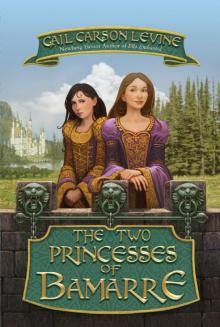 The Two Princesses of Bamarre
The Two Princesses of Bamarre Dave at Night
Dave at Night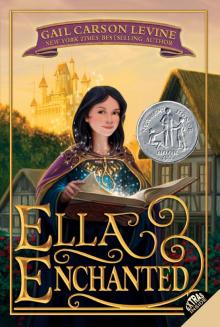 Ella Enchanted
Ella Enchanted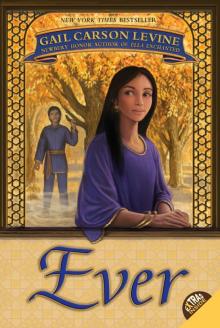 Ever
Ever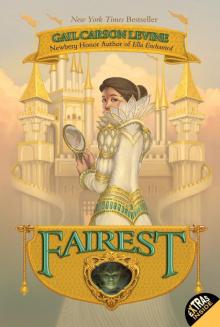 Fairest
Fairest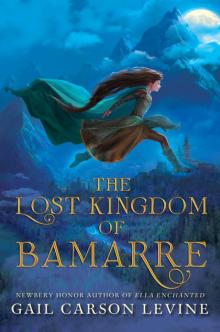 The Lost Kingdom of Bamarre
The Lost Kingdom of Bamarre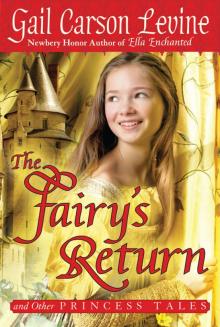 The Fairy's Return and Other Princess Tales
The Fairy's Return and Other Princess Tales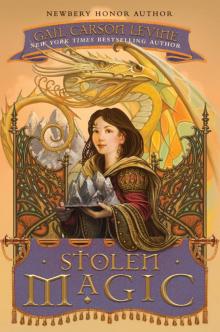 Stolen Magic
Stolen Magic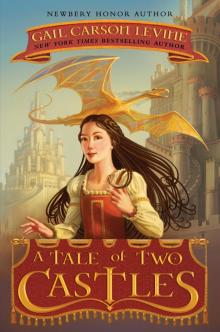 A Tale of Two Castles
A Tale of Two Castles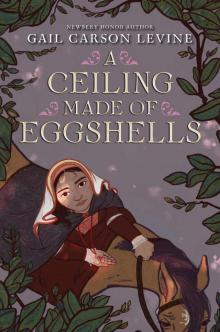 A Ceiling Made of Eggshells
A Ceiling Made of Eggshells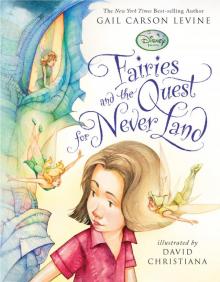 Fairies and the Quest for Never Land
Fairies and the Quest for Never Land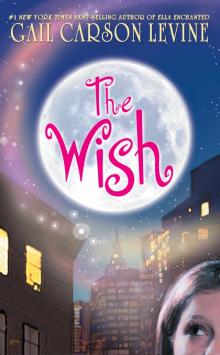 The Wish
The Wish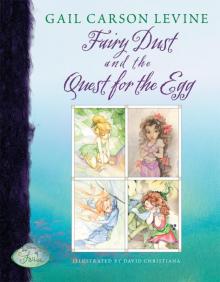 Fairy Dust and the Quest for the Egg
Fairy Dust and the Quest for the Egg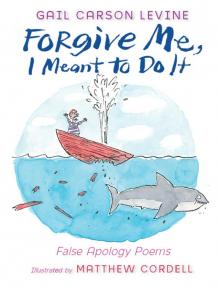 Forgive Me, I Meant to Do It: False Apology Poems
Forgive Me, I Meant to Do It: False Apology Poems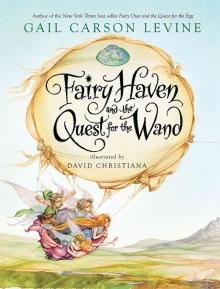 Fairy Haven and the Quest for the Wand
Fairy Haven and the Quest for the Wand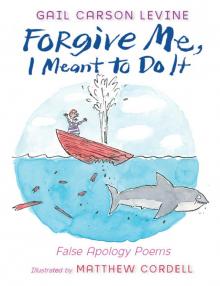 Forgive Me, I Meant to Do It
Forgive Me, I Meant to Do It